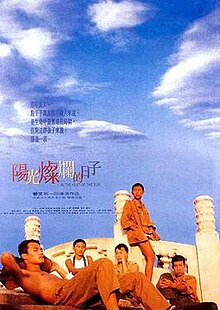In the Heat of the Sun
| In the Heat of the Sun | |
|---|---|
 |
|
| Traditional | 陽光燦爛的日子 |
| Simplified | 阳光灿烂的日子 |
| Mandarin | Yángguāng cànlàn de rìzi |
| Literally | Days of the Bright and Lush Sunshine |
| Directed by | Jiang Wen |
| Produced by | Guo Youliang Hsu An-chin Po Ki |
| Written by | Jiang Wen |
| Based on |
Wild Beast by Wang Shuo |
| Starring |
Xia Yu Ning Jing Geng Le Tao Hong |
| Music by | Guo Wenjing |
| Cinematography | Gu Changwei |
| Edited by | Zhou Ying |
|
Release date
|
1994 |
|
Running time
|
134 minutes |
| Country | China |
| Language | Mandarin |
In the Heat of the Sun is a 1994 film directed and written by Jiang Wen. This was Jiang Wen's first foray into directing after years as a leading man. The film is based on author Wang Shuo's novel Wild Beast (动物凶猛).
The film is set in Beijing during the Cultural Revolution. It is told from the perspective of Ma Xiaojun nicknamed Monkey (played by Xia Yu; some of Monkey's experiences mimic director Jiang's during the Revolution), who is a teenage boy at the time. Monkey and his friends are free to roam the streets of Beijing day and night because the Cultural Revolution has caused their parents and most adults to be either busy or away and school system was extremely nonfunctional during the Cultural Revolution. Jiang Wen cryptically suggested that famous movement during the Cultural revolution that most older young people were sent to the countryside. China was actively preparing for military due to the Vietnam War and claiming USSR to be revisionist. Since Monkey and his friends were military children, their parents were off for military purposes. Most of the story happens during one summer, so the main characters are even more free because there is no school. The events of that summer revolve around Monkey's dalliances with his roguish male friends, and his subsequent angst-filled crush on one of the female characters, Mi Lan (Ning Jing). However, Mi Lan falls in love with Monkey's friend, Liu Yiku.
This film is significant in its unique perspective on the Cultural Revolution. In contrast to the Cultural Revolution-set films of Chinese 5th-generation filmmakers (Zhang Yimou, Chen Kaige, Tian Zhuangzhuang) which put the era into a larger historical setting, In The Heat Of the Sun is mellow and dream-like, portraying memories of that era with somewhat positive and personal resonances. It also acknowledges, as the narrator recalls, that he might have misremembered parts of his adolescence as stated in the prologue: "Change has wiped out my memories. I can't tell what's imagined from what's real", as the director offers alternative or imagined versions to some events as people seek to romanticize their youthful memories. Critic Raymond Zhou talked about this ambiguity in Jiang Wen's movie: "Ambiguity is a major characteristic. Since two of his four features wax nostalgic about the 'cultural revolution' (1966-76), a period that evokes painful memories for many Chinese…" Because of ambiguity of In the Heat of the Sun, Jiang Wen made his film politically acceptable to censors in 1990s. Though in many details, the movie reflects typical historical phenomenon of Cultural Revolution, Jiang Wen did not explicitly mention any specific event during the Cultural Revolution. That was why this movie was the one and only movie about the Cultural Revolution passed the censors during 1990s.
...
Wikipedia
